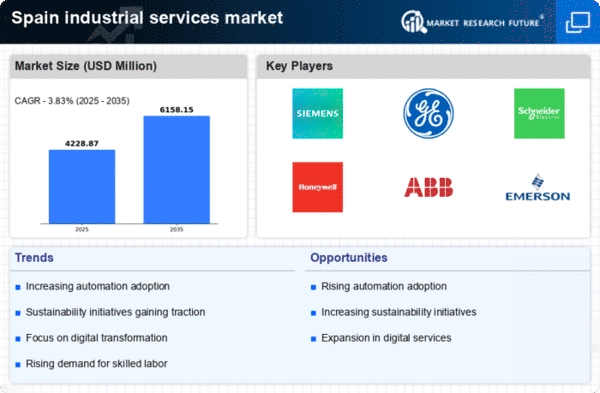Rising Demand for Automation
The industrial services market in Spain is experiencing a notable increase in demand for automation solutions. This trend is driven by the need for enhanced efficiency and productivity across various sectors, including manufacturing and logistics. As companies seek to optimize their operations, the integration of automated systems is becoming essential. According to recent data, the automation sector in Spain is projected to grow at a CAGR of 8.5% from 2025 to 2030. This growth is likely to propel the industrial services market, as service providers adapt to offer specialized automation solutions tailored to client needs. Furthermore, the push for Industry 4.0 technologies is expected to further stimulate this demand, as businesses aim to remain competitive in an increasingly digital landscape.
Investment in Infrastructure Development
Infrastructure development in Spain is a critical driver for the industrial services market. The government has initiated several large-scale projects aimed at modernizing transportation, energy, and communication networks. For instance, the Spanish government allocated approximately €30 billion for infrastructure improvements in 2025 alone. This investment is likely to create substantial opportunities for industrial service providers, as they will be required to support these projects with maintenance, repair, and operational services. Additionally, the focus on enhancing infrastructure is expected to attract foreign investments, further boosting the industrial services market. As these developments unfold, service providers must be prepared to meet the increasing demand for specialized services that align with the evolving infrastructure landscape.
Regulatory Compliance and Safety Standards
Regulatory compliance and safety standards are becoming increasingly stringent in Spain, significantly impacting the industrial services market. Companies are required to adhere to various regulations concerning environmental protection, workplace safety, and operational efficiency. As a result, there is a heightened demand for services that ensure compliance with these regulations. In 2025, it is estimated that compliance-related services will account for approximately 15% of the total industrial services market. This trend indicates a growing need for specialized consulting and support services that help businesses navigate complex regulatory landscapes. Service providers must stay abreast of changing regulations and offer tailored solutions that assist clients in maintaining compliance while optimizing their operations.
Focus on Workforce Training and Development
The industrial services market in Spain is increasingly influenced by the emphasis on workforce training and development. As industries evolve, there is a growing recognition of the need for skilled labor to operate advanced technologies and systems. In response, many companies are investing in training programs to enhance employee capabilities. Reports indicate that approximately 60% of firms in the industrial sector are prioritizing workforce development initiatives in 2025. This focus not only improves operational efficiency but also contributes to employee retention and satisfaction. Consequently, service providers in the industrial services market must adapt their offerings to include training and development services, ensuring that clients can effectively utilize new technologies and maintain a competitive edge.
Emergence of Digital Platforms for Service Delivery
The emergence of digital platforms is transforming the industrial services market in Spain. These platforms facilitate the delivery of services through innovative technologies, enabling companies to streamline operations and enhance customer engagement. In 2025, it is projected that digital service platforms will account for around 20% of the market share. This shift towards digitalization allows service providers to offer more efficient and responsive solutions, catering to the evolving needs of clients. Moreover, the integration of data analytics and IoT technologies into service delivery is likely to improve decision-making processes and operational efficiency. As the industrial services market continues to embrace digital transformation, service providers must invest in technology to remain competitive and meet the demands of a tech-savvy clientele.
















